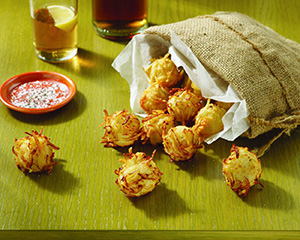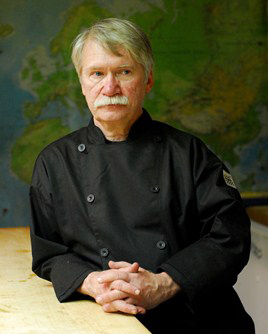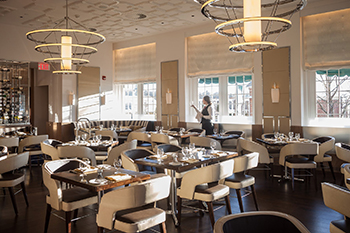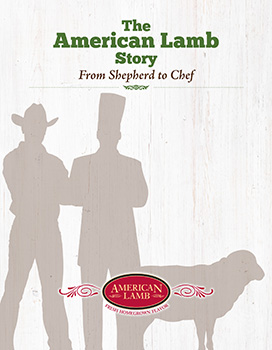Four Educators Prepare for ACF’s Certified Master Chef® Exam
Hosted by Le Cordon Bleu North America and taking place on the West Coast for the first time, successful candidates will join an elite group of only 67 chefs in the United States.
Eleven chefs from across the nation are preparing to take the ultimate culinary test—the American Culinary Federation’s (ACF) Certified Master Chef® (CMC) exam. The eight-day exam will be held Oct. 26-Nov. 2 at Le Cordon Bleu College of Culinary Arts in Los Angeles, Pasadena, Calif.
Among the 11, four are foodservice educators. They are
- Timothy Bucci, CEC, CCE, CHE, culinary-arts instructor, Joliet Junior College, Joliet, Ill.
- Kevin Quinn, CEC, lead chef instructor, Le Cordon Bleu College of Culinary Arts in Austin, Texas
- Daryl Shular, CEC, director of education/executive chef, Le Cordon Bleu College of Culinary Arts in Atlanta, Tucker, Ga.
- Randy Torres, CEC, AAC, chef instructor, Oregon Coast Culinary Institute, Coos Bay, Ore.

 As Tater Tots® hit the Big 60, the Idaho Potato Commission celebrates six decades of tot-inspired menu creativity.
As Tater Tots® hit the Big 60, the Idaho Potato Commission celebrates six decades of tot-inspired menu creativity. This second installment in a four-part series on assessment methods focuses on oral presentations and class participation.
This second installment in a four-part series on assessment methods focuses on oral presentations and class participation. Integration of industry and education better prepares students for success and makes a school essential in the eyes of all stakeholders. Good news is that opportunities for your program to partner with your local business community are endless.
Integration of industry and education better prepares students for success and makes a school essential in the eyes of all stakeholders. Good news is that opportunities for your program to partner with your local business community are endless. New research from the National Restaurant Association shows a substantial number of operators are implementing sustainability best practices into their businesses.
New research from the National Restaurant Association shows a substantial number of operators are implementing sustainability best practices into their businesses. Twenty restaurants across the United States were recipients of 2014 Achievement of Excellence Awards from the American Culinary Federation (ACF) this summer. Three of them are on The Culinary Institute of America’s Hyde Park, N.Y. campus: American Bounty Restaurant, The Bocuse Restaurant, and Ristorante Caterina de’ Medici. In addition, nine CIA graduates were honored at the organization’s awards event held during the ACF national conference in Kansas City, Mo., in July.
Twenty restaurants across the United States were recipients of 2014 Achievement of Excellence Awards from the American Culinary Federation (ACF) this summer. Three of them are on The Culinary Institute of America’s Hyde Park, N.Y. campus: American Bounty Restaurant, The Bocuse Restaurant, and Ristorante Caterina de’ Medici. In addition, nine CIA graduates were honored at the organization’s awards event held during the ACF national conference in Kansas City, Mo., in July. Discover homegrown American lamb stories and recipes to inspire your menu. A new booklet from the American Lamb Board shares information on American lamb from shepherds to chefs across the country. The booklet also includes chef-developed recipes including chorizo-spiced lamb loin and merguez flatbread. To order your fee copy of the booklet, e-mail
Discover homegrown American lamb stories and recipes to inspire your menu. A new booklet from the American Lamb Board shares information on American lamb from shepherds to chefs across the country. The booklet also includes chef-developed recipes including chorizo-spiced lamb loin and merguez flatbread. To order your fee copy of the booklet, e-mail  The National Mango Board announces the release of a new tool to inspire menu innovation, Mango Flavor Pairing Guide. The guide was developed to create excitement about fresh mango as a versatile ingredient, the key to innovation all across menus, all year ’round. The mango pairings showcase complementary and contrasting sensory combinations from familiar to surprising.
The National Mango Board announces the release of a new tool to inspire menu innovation, Mango Flavor Pairing Guide. The guide was developed to create excitement about fresh mango as a versatile ingredient, the key to innovation all across menus, all year ’round. The mango pairings showcase complementary and contrasting sensory combinations from familiar to surprising.